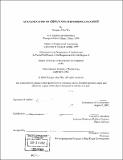An examination of China's non-performing loan issue
Author(s)
Wu, Xiaojun Allan, 1973-
DownloadFull printable version (3.776Mb)
Other Contributors
Massachusetts Institute of Technology. Dept. of Urban Studies and Planning.
Advisor
Edward S. Steinfeld.
Terms of use
Metadata
Show full item recordAbstract
Non-performing loans (NPLs) are essentially a product of the irrational allocation of resources. Different from other Asian countries, China's NPL issue resulted primarily from a transitioning economy dominated by the triangular relations of state-owned enterprises (SOEs), state-owned commercial banks (SOBs) and the fiscal system. Even though the total amount of NPLs in 1999 was estimated to be around 30% of the total outstanding loans of SOBs, the NPL problem in China would not lead to an immediate financial crisis as the NPL problem is more a stock problem than a flow one. However, the huge amount of overhanging bad debts has become one of the bottlenecks for China's further reform, particularly, in the banking sector. The establishment of four Asset Management Companies (AMCs) was an innovative approach to provide an instant relief of the bad debt burden of SOBs, to recover distressed assets and to restructure SOEs. Despite facing many challenges, the AMCs have been continuously seeking new NPL workout approaches and made substantial progress. A series of workout approaches have been introduced including debt-equity swap, discounted payoff, loan pool sale and property auction, etc. The process, however, will become increasingly difficult because the high quality assets have been disposed of first and the more troubled ones still remain in the portfolio. Furthermore, if the government cannot make a creditable commitment that the current NPL transfer and debt-equity swap is a once-off policy, new NPLs will be encouraged through soft lending by the SOBs and strategic default by the SOEs. There are also several obstacles ahead to the AMCs including China's immature capital market, the AMCs' internal structural problems as well as China's weak legal enforcement mechanism. Fortunately, the Chinese government has made a great commitment to tackle the NPL issue not only from the surface but also from the fundamental structure, evidenced by the Chinese government's efforts to improve the corporate governance of SOEs and institutional infrastructures. China's accession to the WTO in 2001 will further force the government to seriously reform the banking sector in order to build up the competitive advantage to face the imminent competition from foreign banks. With more international practices introduced and corporate governance improved, China's banking system could be more resilient and healthier in the near future. The AMC scheme would hopefully be a once-off prescription.
Description
Thesis (S.M.)--Massachusetts Institute of Technology, Dept. of Urban Studies and Planning, 2002. Includes bibliographical references (leaves 61-62).
Date issued
2002Department
Massachusetts Institute of Technology. Department of Urban Studies and PlanningPublisher
Massachusetts Institute of Technology
Keywords
Urban Studies and Planning.